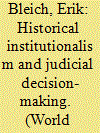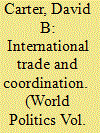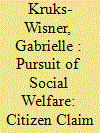|
|
|
Sort Order |
|
|
|
Items / Page
|
|
|
|
|
|
|
| Srl | Item |
| 1 |
ID:
158575


|
|
|
|
|
| Summary/Abstract |
Why and how do institutions strengthen? This article offers an explanation of institutional strength based on the study of participatory institutions. Combining the insights of historical institutionalism and participatory democracy literatures, the authors propose an endogenous theory of participation and argue that the strength of participatory institutions depends on the historic process of their creation and the subsequent political incorporation of the mobilized groups that bring them about. The authors comparatively study prior consultation in Bolivia and Ecuador since its inception in the 1990s. This institution is highly relevant in Latin America, particularly as countries in the region intensify the extraction of nonrenewable resources. The article shows that different paths of political incorporation of the groups mobilized for institutional adoption were consequential to the resulting institutional strength. The findings shed light on the tensions between participatory democracy and resource extraction in Latin America and have important implications for the study of participatory and political institutions worldwide.
|
|
|
|
|
|
|
|
|
|
|
|
|
|
|
|
| 2 |
ID:
158574


|
|
|
|
|
| Summary/Abstract |
This article integrates insights from different veins of historical institutionalism to offer an analytical framework that specifies how ideas, institutions, and actors account for key aspects of judicial decision-making, including change over time. To the extent that ideas are widely distributed, highly salient, and stable among actors in the judicial field, they can affect patterns of rulings in a particular issue area. The distribution, salience, and stability of norms, however, may change over time for reasons embedded in the institutional structures themselves. Existing policies, laws, or treaties create the potential for new actors to enter the judicial field through processes that theorists of institutional change have identified as intercurrence, displacement, conversion, layering, and drift. New actors can shift the relative salience of ideas already rooted in the judicial field. This ideational salience amplification can alter patterns of judicial decision-making without the fundamental and often costly battles involved in wholesale paradigm change. French high court hate speech decisions provide the context for the development of this framework and serve to illustrate the dynamic. The author uses evidence from an original dataset of every ruling by the French Court of Cassation regarding racist hate speech from 1972 through 2012 to explain the varying propensity of the high court to restrict speech that targets majorities compared to minorities.
|
|
|
|
|
|
|
|
|
|
|
|
|
|
|
|
| 3 |
ID:
158573


|
|
|
|
|
| Summary/Abstract |
This article examines how the institutional design of borders affects international trade. The authors explore variation in the effects of borders by comparing new international borders that follow precedent and thus have a prior institutional history with new international borders that lack such an institutional history. The former minimally disrupt—or restore—previous economic networks, while the latter fundamentally disrupt existing economic networks. A variety of empirical tests show that, consistent with this institutional perspective on borders, new international boundaries that follow precedent are associated with significantly faster recovery and greater increase in subsequent trade flows. By contrast, when new international borders are truly new, they disrupt local economic networks, introduce new transaction costs, and impose higher adjustment costs on states, which the authors show to have long-term deleterious effects on trade.
|
|
|
|
|
|
|
|
|
|
|
|
|
|
|
|
| 4 |
ID:
158576


|
|
|
|
|
| Summary/Abstract |
Who makes claims on the state for social welfare, and how and why do they do so? This article examines these dynamics in the rural Indian context, observing that citizens living in the same local communities differ dramatically in their approaches to the state. The author develops a theory to explain these varied patterns of action and inaction, arguing that citizen claim-making is best understood as a product of exposure to people and places beyond the immediate community and locality. This social and spatial exposure builds citizens’ encounters with, knowledge of, and linkages to the state. This in turn develops their aspirations toward the state and their capabilities for state-targeted action. The author tests the theory in rural Rajasthan, drawing on a combination of original survey data and qualitative interviews. She finds that those who traverse boundaries of caste, neighborhood, and village are more likely to make claims on the state, and that they do so through broader repertoires of action than those who are more constrained by the same boundaries. The article concludes by considering the extensions and limitations of the theory and the role of the state itself in establishing the terrain for citizen action.
|
|
|
|
|
|
|
|
|
|
|
|
|
|
|
|
|
|
|
|
|